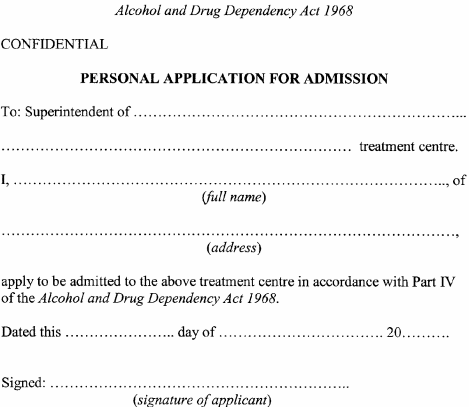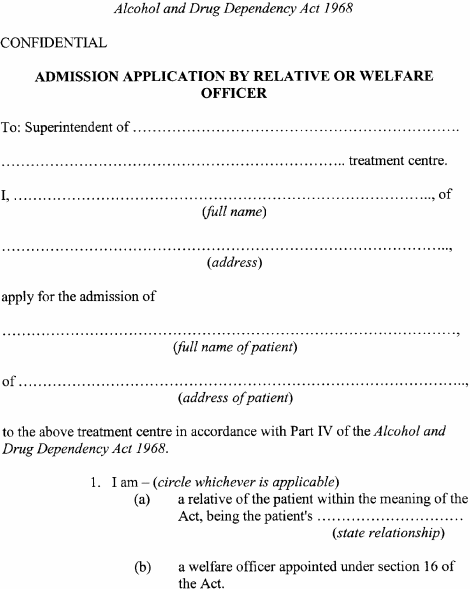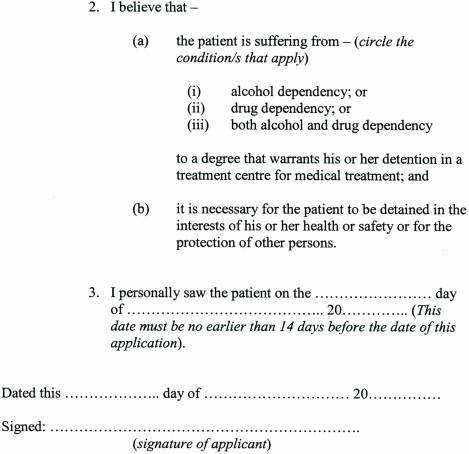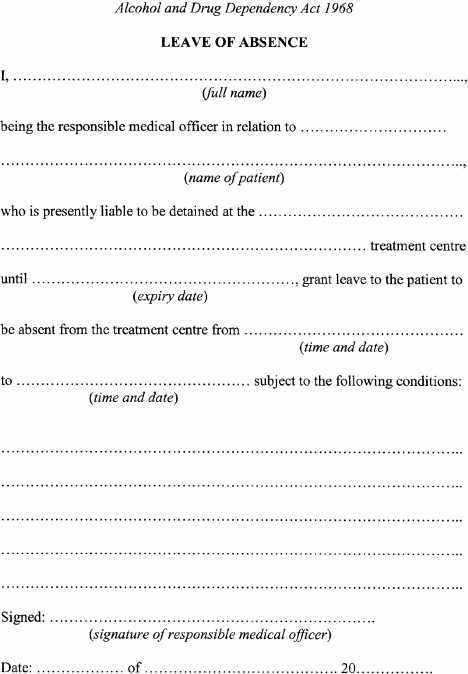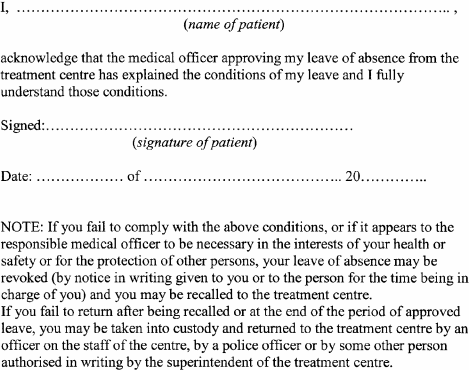Alcohol and Drug Dependency Regulations 2009
I, the Governor in and over the State of Tasmania and its Dependencies in the Commonwealth of Australia, acting with the advice of the Executive Council, make the following regulations under the Alcohol and Drug Dependency Act 1968 .
14 December 2009PETER G. UNDERWOOD
Governor
By His Excellency's Command,
LARA GIDDINGS
Minister for Health
PART 1 - Preliminary
These regulations may be cited as the Alcohol and Drug Dependency Regulations 2009 .
These regulations take effect on 29 December 2009.
(1) In these regulations –Act means the Alcohol and Drug Dependency Act 1968 .(2) In these regulations, a reference to a form, quoted by a number, is a reference to the form of that number specified in Schedule 1 .
PART 2 - General Provisions Relating to Admissions and Leave of Absence
For the purposes of section 23(3) of the Act, an admission application –(a) in the case of a personal application, is to be in accordance with Form 1; and(b) in the case of any other application, is to be in accordance with Form 2.
For the purposes of section 45(1) of the Act, a leave of absence form is to be in accordance with Form 3.
PART 3 - Tribunal and Applications to Tribunal
In this Part –application means an application to the Tribunal under section 29(1) of the Act for an order for the discharge of a patient from the liability to be detained in a treatment centre;patient, in relation to an application, means the patient to whom the application relates.
7. Applications under section 29(1) of Act
(1) An application is to be lodged with the clerk of the Tribunal.(2) An applicant is to include in his or her application a request for –(a) a formal hearing by the Tribunal; or(b) an informal hearing by the Tribunal.(3) The clerk of the Tribunal is, as soon as practicable after receiving an application under subregulation (1) , to provide a copy of the application to –(a) the chairperson of the Tribunal; and(b) the superintendent of the treatment centre in which the patient is liable to be detained.(4) Within 20 working days after receipt of an application under subregulation (1) , the Tribunal is to –(a) conduct a formal hearing of the application; or(b) dispose of the application in accordance with regulation 12 .
8. Procedure after applications lodged
The superintendent is, within 5 working days after receiving a copy of the application under regulation 7(3) , to give the clerk of the Tribunal a statement as to whether or not the superintendent is prepared to discharge the patient, and the reasons for that decision.
9. Powers and duties of Tribunal and superintendents
(1) The superintendent of a treatment centre, if requested to do so by the Tribunal, is to provide the Tribunal with all information in the superintendent's possession relevant to an application.(2) The superintendent of a treatment centre is, at the request of a member of the Tribunal, to permit the member to interview a patient who is detained in the treatment centre.(3) The superintendent may permit an interview under subregulation (2) to be in private if an interview in private is requested by –(a) the relevant patient; or(b) the relevant member of the Tribunal.(4) Despite subregulation (3) , the superintendent may decide not to permit an interview to be conducted in private if the superintendent considers that it would not be in the interests of –(a) the health or safety of the relevant patient; or(b) the health or safety of another person or persons; or(c) the good order and security of the treatment centre.(5) The Tribunal is to make the following information available to the applicant, the patient (if not the applicant) and the superintendent of the treatment centre in which the patient is liable to be detained:(a) a copy of all documents obtained or provided to the Tribunal in connection with the relevant application;(b) a statement of all oral information obtained or provided to the Tribunal in connection with the application.(6) The Tribunal is not required to make the information specified in subregulation (5) available if the Tribunal considers that it would be undesirable to do so in the interests of the patient or for other special reasons.
(1) If the Tribunal conducts a formal hearing, the Tribunal is to give at least 5 working days' notice of the date, time and place of the formal hearing to –(a) the applicant; and(b) the patient, if he or she is not the applicant; and(c) the superintendent of the treatment centre in which the patient is liable to be detained; and(d) any other person who, in the Tribunal's opinion, has an interest in the application.(2) The Tribunal may –(a) subject to subregulation (3) , exclude a person or class of persons from a formal hearing of an application; and(b) prohibit publication of –(i) a report in relation to a formal hearing; or(ii) the name of a person involved in a formal hearing; or(iii) any information that could reasonably be expected to identify a patient.(3) The Tribunal is to permit the following persons to be heard by, and make representations to, the Tribunal in respect of a formal hearing of an application:(a) the applicant;(b) the patient, if he or she is not the applicant;(c) any other person referred to in subregulation (1) .(4) A representation to the Tribunal is to be –(a) in writing; and(b) lodged with the Tribunal before the hearing starts.(5) The Tribunal is to allow the following persons to call witnesses and be represented or accompanied by another person:(a) the applicant;(b) the patient, if he or she is not the applicant.(6) A person specified in subregulation (3) may be represented by another person for the purposes of the hearing only if –(a) the person specified in subregulation (3) is unable or unwilling to appear or be heard in person; and(b) the person specified in subregulation (3) authorises the other person, in writing, to attend as his or her representative.
(1) The Tribunal may adjourn the formal hearing of an application at any time.(2) The Tribunal is to adjourn the formal hearing of an application for the consideration of information made available at the hearing, if requested to do so by –(a) the applicant; or(b) the patient, if he or she is not the applicant.(3) Except with the consent of the applicant, the formal hearing of an application is not to be adjourned for a period of more than 10 working days.(4) If, after an adjournment, the formal hearing of an application is resumed, the Tribunal is to give at least 5 working days' notice of the resumption of the formal hearing to –(a) the applicant; and(b) the patient, if he or she is not the applicant; and(c) the superintendent of the treatment centre in which the patient is liable to be detained; and(d) any other person that the Tribunal considers should be given notice of the resumption of the formal hearing.
(1) The Tribunal may decide not to conduct a formal hearing and may dispose of an application in the manner the Tribunal thinks appropriate if –(a) an applicant has not requested a formal hearing under regulation 7(2) ; or(b) the Tribunal considers that a formal hearing would not be in the interests of the patient.(2) If the Tribunal decides to dispose of an application without a formal hearing, the Tribunal is to –(a) give the following persons an opportunity of an interview with the Tribunal at a date, time and place of which at least 5 working days' notice is to be given:(i) the applicant;(ii) the patient, if he or she is not the applicant;(iii) the superintendent of the treatment centre in which the patient is liable to be detained;(iv) any other person who, in the Tribunal's opinion, has an interest in the application; and(b) consider representations made to it during those interviews; and(c) take all other steps it considers necessary to decide the case.(3) The Tribunal is, at the request of the person being interviewed, to permit that person to be interviewed in private unless the person is detained at a treatment centre and the superintendent of the treatment centre considers that it would not be in the interests of –(a) the health or safety of the patient; or(b) the health or safety of another person or persons; or(c) the good order and security of the treatment centre.(4) A person interviewed by the Tribunal is to be given an opportunity to –(a) state his or her views; and(b) draw the attention of the Tribunal to evidence or information relevant to the application.
13. Withdrawal of applications
(1) An applicant may withdraw his or her application at any time by notice in writing to the Tribunal.(2) An application is taken to be withdrawn if the patient ceases to be liable to be detained in the relevant treatment centre.
(1) The Tribunal, within 5 working days after making a decision in respect of an application, is to notify the following persons of that decision:(a) the applicant;(b) the patient, if he or she is not the applicant;(c) the superintendent of the treatment centre in which the patient is liable to be detained.(2) If the Tribunal refuses to approve an application, the Tribunal, when notifying the persons specified in subregulation (1) of that decision, is to provide those persons with a statement of the Tribunal's reasons for the refusal.(3) The Tribunal is not required to provide a statement of the Tribunal's reasons under subregulation (2) if the Tribunal considers that it would be undesirable to do so in the interests of the patient or for other special reasons.
SCHEDULE 1 - Forms
Form 1
Form 2
Form 3
Displayed and numbered in accordance with the Rules Publication Act 1953.
Notified in the Gazette on 23 December 2009
These regulations are administered in the Department of Health and Human Services.
EXPLANATORY NOTE
(This note is not part of the regulation)
These regulations –(a) prescribe forms for an application for admission to, and leave of absence from, a treatment centre; and(b) make provision in respect of applications for an order of discharge from a treatment centre; and(c) are made consequentially on the repeal of the Alcohol and Drug Dependency Regulations 1999 under section 11 of the Subordinate Legislation Act 1992 .


